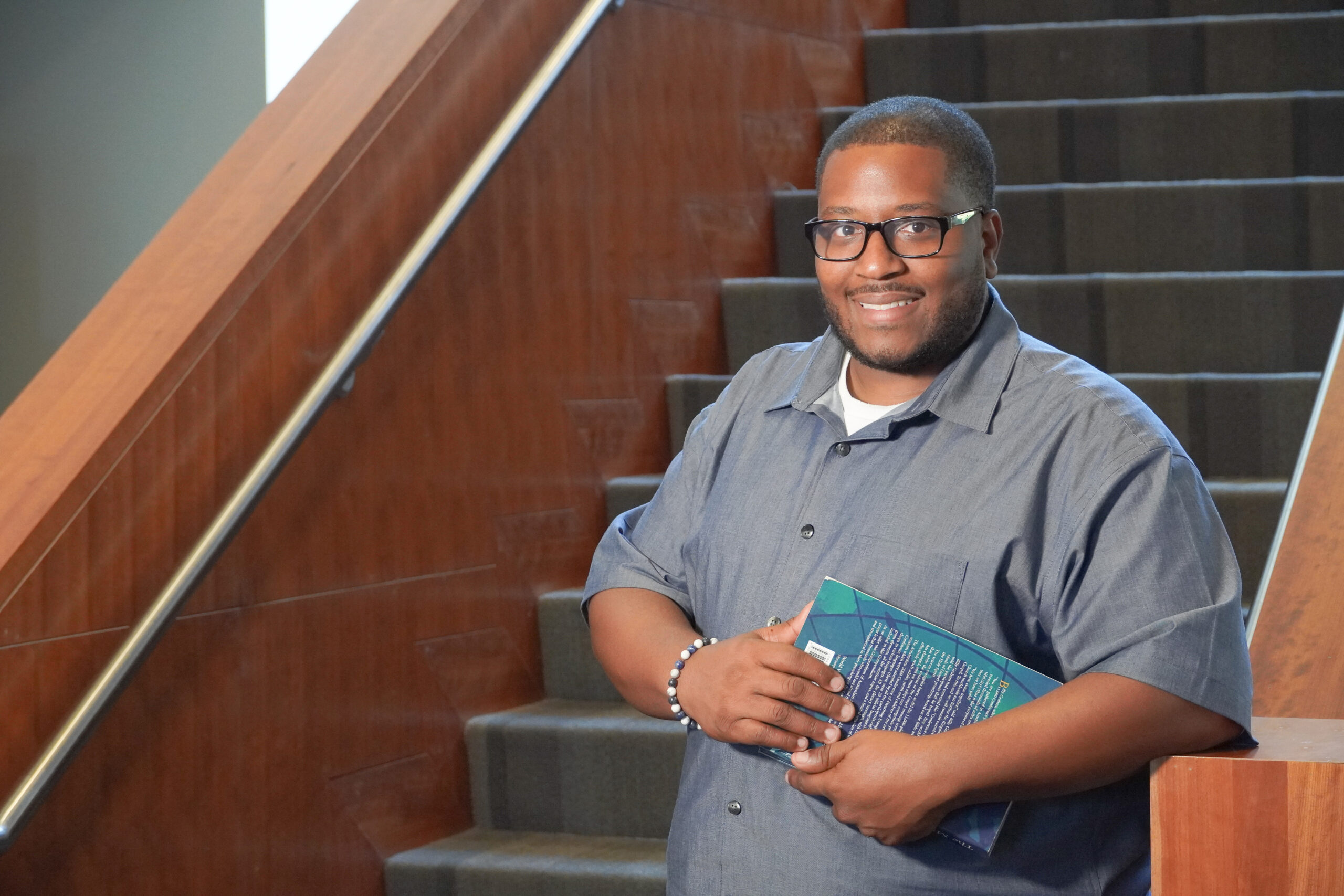Our Seminary
Degree Programs
Explore Degrees Aligned With Real Careers
English Degrees
| Doctor of Ministry in Creative Leadership | Doctor of Ministry in Missional Church Studies | Master of Divinity | Master of Arts (Theological Studies) | Master of Arts in Counseling | |
|---|---|---|---|---|---|
| Credit Hours | 30 | 30 | 75 | 36 | 60 |
| Average Years to Complete | 3 | 3 | 4 | 2 | 3 to 4 |
| Tuition per Credit before Scholarships | 530 | 530 | 405 | 405 | 405 |
| Eligible for Scholarships | |||||
| Eligible for International Students | |||||
| Accredited | |||||
| Starts in any Term | |||||
| Online | Partial | 100% | 100%* | 100% | Partial |
| Thesis, Dissertation or Capstone Required | |||||
| Internship/Experience Hours Required | * | * | |||
| Customizable with Certificate(s) | |||||
| Commonly used to pursue Ordination | |||||
| Designed for Ministry Work | |||||
| Suitable for those interested in PhD studies | |||||
| Designed for Clinical Counseling (Licensed) | |||||
| Helpful for pursuing a Chaplaincy job | ** | ||||
| Helpful for Non-Profit Administration | |||||
| Suitable for Personal Interest |
English Diploma and Certificates
| Diploma in Theological Studies | Certificate in Chaplaincy (Graduate / Credit) | Certificate in Chaplaincy (Professional / Non-Credit) | Certficate in Peace and Justice Ministry (Graduate / Credit) | Certficate in Peace and Justice Ministry (Professional / Non-Credit) | |
|---|---|---|---|---|---|
| Credit Hours | 48 | 18 | 6 Courses – 18 Credits Equiv. | 12 | 2 Courses – 8 Credits Equiv. |
| Average Years to Complete | 3 | 1 | 1 | 1 | 1 |
| Tuition per Credit before Scholarships | 405 | 405 | 200 | 405 | 125 |
| Eligible for Scholarships | |||||
| Eligible for International Students | |||||
| Accredited | |||||
| Starts in any Term | |||||
| Online | 100% | 100%* | 100%* | 100%* | 100%* |
| Internship/Experience Hours Required | * | * | * | * | * |
| Helpful for Ministry Work | |||||
| Helpful for pursuing a Chaplaincy job | ** | ** | |||
| Suitable for Personal Interest |
Korean Degrees
| Doctor of Ministry in Missional Church Studies | Master of Divinity | Master of Arts in Missional Church Studies | Master of Christian Care and Counseling | Diploma in Christian Formation | |
|---|---|---|---|---|---|
| Credit Hours | 30 | 75 | 36 | 36 | 96 |
| Average Years to Complete | 3 | 4 | 2 | 2 | 4 |
| Tuition per Credit before Scholarships | 530 | 405 | 405 | 405 | 405 |
| Eligible for Scholarships | |||||
| Eligible for International Students | |||||
| Accredited | |||||
| Starts in any Term | |||||
| Online*** | 100% or Partial*** | 100% or Partial*** | 100% or Partial*** | 100% or Partial*** | 100% or Partial*** |
| Thesis, Dissertation or Capstone Required | |||||
| Internship/Experience Hours Required | |||||
| Commonly used to pursue Ordination | |||||
| Designed for Ministry Work | |||||
| Designed for Counseling (non-licensed) |
|||||
| Helpful for pursuing a job as a chaplain | ** | ||||
| Helpful for Non-Profit Administration | |||||
| Suitable for Personal Interest |
Central is wildly inclusive. There is diversity; intergenerational, multi-denominational, people from different walks of life and different parts of the world. I needed a place where I could be my authentic self.”
CJ Duffie
Central Seminary MDiv Student
Admissions
Admissions vary from program to program. See individual programs for specific admissions information. Master’s program students should have a bachelor’s degree from an accredited institution and doctoral program students need a master’s degree. However, special cases may be considered for admissions if students complete courses within the diploma program. There are English and Korean program courses available where students will be required to display a proficiency in those languages to apply.
Central Seminary Applications Calendar
| Session | Start Date | Application Deadline |
|---|---|---|
| Lent 2025 (January - March) | January 6, 2025 | December 9, 2024 |
| Easter 2025 (May - July) | May 5, 2025 | April 14, 2025 |

Why Choose an Online Seminary Degree from Central?
Flexible Schedules
Whether you work during the day or at night, online education gives you the choice to build a convenient schedule that compliments the other responsibilities in your life.
Low Tuition
An online degree in theology will help you save on housing, transportation costs, and commute times. Scholarship opportunities are available to all degree-seeking students. Payment plans are also available to make your education affordable.
Diverse Student Body
Central Seminary offers a theologically diverse atmosphere where all perspectives, denominations, and backgrounds are welcome. Students have diverse backgrounds and come from a variety of global cultures and languages.
Experienced Online Seminary
Central Seminary was founded in 1901 and has been providing innovative online education since 2010. This experience gives you many possibilities for your future career choice.
Learn MoreSeminary Program Tuition Information
Here is a quick breakdown of the 2024-2025 tuition and fee costs associated with Central Seminary degree programs.
Tuition
- $405 per credit (all programs, excluding Doctoral programs, unless otherwise noted on program page)
- $530 per credit (Doctoral)
Fees
- $250 per term (all programs unless otherwise noted on program page)
Books (estimate)
- $100 per class (Diploma and Master’s)
- $150 per class (Doctoral)
Financial Aid
Students can apply for scholarships and grants offered through Central Seminary and outside organizations. At Central Seminary, all degree seeking students are eligible for institutional grants or scholarships. You can apply here.
You Can Afford Your Degree at Central Seminary.
Frequently Asked Questions
Check out these answers to frequently asked questions.
Why is a seminary degree important?
A seminary degree is like any other form of higher education. It provides students with knowledge, context, credentials, connections, and it shows potential employers that you are committed to starting and finishing something. Some jobs will require certain degrees that only a seminary can provide while others prefer candidates to have a specific type of training.
How much time does it take each week to be successful in seminary?
It depends. The number of credit hours you are in enrolled in, how many hours you work an outside job and other personal and professional obligations all make a difference. But a common rule of thumb is that you’ll spend two to three hours outside the classroom on assignments and reading for every one hour of classroom time per week. So a three credit hour class will have three hours of instruction per week and students should expect an additional 6-9 hours per week of work.
Is Central Seminary a Baptist seminary?
Central Seminary was founded by Kansas Baptists leaders in 1901. The seminary continues to be closely affiliated with the American Baptist Churches-USA and with the Cooperative Baptist Fellowship. While Central is historically Baptist, our seminary is ecumenical. Students from many different faith traditions find Central a comfortable and welcoming environment in which to study.
What is Central’s history?
Central was founded in 1901 in Kansas City, Kansas. Read more about Central’s history here.
Is Central Seminary ecumenical?
Yes. Central is welcoming of people from all different faith traditions. While many of our students are Baptists, others affiliate with a variety of denominations, including African Methodist Episcopal, Disciples of Christ, Episcopal, Methodist, Non-Denominational, Presbyterian, and United Church of Christ. Still others of our students are not affiliated with a particular tradition. This diversity in theological background and affiliation is also true for our faculty and staff.
What do Central Seminary faculty believe?
The faculty of Central seminary have vastly different and personal sets of beliefs just like the students they teach. There is not a specific theology or creed they are asked to affirm before being hired and are not required to teach by one. Most students find that faculty are supportive of a wide variety of beliefs.
Why is accreditation important?
According to the Higher Learning Commission, “Accreditation provides current and potential students assurance that they are receiving a quality education which will be recognized as such by potential employers or licensing boards as well as by other colleges or universities in case of student transfers or pursuit of a higher degree.” Central is proudly accredited by the Higher Learning Commission and the Association of Theological Schools.
Who is HLC?
The Higher Learning Commission (HLC) is an independent corporation that was founded in 1895 as one of six regional accreditors in the United States. HLC accredits degree-granting post-secondary educational institutions in the United States. HLC is as an institutional accreditor, accrediting the institution as a whole. HLC is a private not-for-profit company that is recognized by the U.S. Department of Education to act on its behalf as an institutional accrediting agency. You can learn more about HLC here.
Who is ATS?
The Association of Theological Schools (ATS) is the nations leading accreditor for more than 270 graduate schools of theology in the United States and Canada. According to the ATS website, “While [their member schools] differ from one another in deep and significant ways but, through their membership in ATS, they demonstrate a commitment to shared values about what constitutes good theological education.
Is Central welcoming and affirming for those in the LBGTQIA+ community?
Yes! Central is affirming of ALL people and welcomes students, staff and faculty who are part of the LBGTQIA+ community.
What is Central’s statement on diversity, inclusion, verbal conduct and non-discrimination?
Central’s Board of Trustees and our leadership are committed to creating a healthy place for learning and growth. Discriminatory attitudes and behaviors, whether intentional or unintentional, are not acceptable within our community. Any employee or student who exhibits or participates in deliberate or unwitting behaviors that are offensive or discriminatory to individuals with reference to their age, disability, ethnicity, gender, gender identity, genetic information, national origin, race/color, religion, sexual orientation or veteran status will be subject to disciplinary action that may result in suspension or dismissal from the institution.
Read the full policies and find the misconduct report form on the Consumer Information page.
What is Central’s student covenant?
“As a student of Central Seminary actively examining God’s call, I covenant with God and this community to serve Christ in the ministries to which I am called with God’s help, to deepen my obedience to the two Great Commandments: to love the Lord our God and to love my neighbor. In affirmation of this commitment, I will abide by the Covenant and Code of Ethics of the students of Central Seminary. I will faithfully support its purposes and ideals. As further affirmation of my commitment, I covenant with my colleagues in ministry that we will hold one another accountable for fulfillment of all public actions set forth in our Code of Ethics. I will show my personal love for God as revealed in Jesus Christ in my life and ministry. I will strive with others to preserve dignity, maintain discipline, and promote the integrity of the vocation to which I have been called. I will display academic integrity. I will encourage others to study, discuss, work, and pray together. All work, both written and oral, submitted for a grade shall be my own original work. I will respect the faculty and administration. In matters of academic evaluation, I will utilize proper channels for airing grievances. I will develop and maintain a lifestyle that reflects God as the center of my life in thought, speech, and action. I will respect the diversity in Christian heritage, traditions, and beliefs held by others. I will personally and publicly support my colleagues who experience discrimination on the basis of gender, gender identity, race, age, marital status, sexual orientation, national origin, physical impairment, or disability. I will exercise discretion in confidential matters.”
What is Central’s mission, vision and values?
We have big hopes and dreams for the world. To make them a reality we need a mission, vision, and values to help us get there. Check here to read about our mission, vision, and values.
Does Central offer degrees completely online?
Yes, many of our programs can be completed 100% online. Most of our online classes require participation in regular live sessions through a video conferencing program, such as Zoom.
How does a theological degree help me get a job?
All degrees at Central Seminary are prepared with the intent to help graduates find fulfilling careers. Potential jobs include leadership roles in faith-based organizations like hospitals, non-profits, or in congregational settings. Some graduates pursue careers in teaching, research, youth ministry, or as missionaries.
Do online seminary programs have the same accreditation as in-person classes?
Online degrees are indistinguishable from our in-person programs, which are all fully accredited. Your degree will not indicate whether or not yours was earned either online or in-person.
How does Central build community among students that are online?
Yes, the school offers a variety of options for students to gather and worship outside of class, such as chapels, events, and gatherings specifically for students to discuss their studies and vocation. Since most of our student body is participating in online education, we provide many of these opportunities through video conferencing.
What spiritual growth opportunities are at Central?
Like community building, there are opportunities to grow spiritually at Central. In addition to chapels and student gatherings, we believe your classes and coursework should grow your heart and mind not just your knowledge and skills. Seminary is a journey of growth unique from many other academic institutions. The whole experience should be part of a growing, developing connection with God’s Spirit.
What is Refectory?
Refectory is one of Central’s opportunities for students to gather and discuss what they are learning, their life as a student, and connect with others going through seminary journey. Meetings times can vary based on schedules and needs. Students only need to stay tuned to their CBTS email as upcoming Refectory meetings will be advertised there.
What is Convocation?
Convocation is the gathering of the learning community in preparation for the upcoming term. It celebrates the beginning of a new experience and challenges the Central community to focus on the mission of the school. Convocations occur in August and January of each academic year.
What is Chapel?
Chapels are worship opportunities of the seminary community. Each chapel is typically 30-45 minutes in the early evening before classes. Chapel speakers can include faculty, alums, administrators, or anyone connected to the seminary community. Chapels are accessible through live web conferencing and are promoted through email, the seminary website, and social media.
How do I access the library if I am an online student?
The library provides many research databases online. These research databases can be accessed through the student portal, myCBTS. These databases offer tens of thousands of resources for our programs, including articles and full books. Online accessible databases include the Digital Theological Library, ATLA Religion, and ProQuest Religion. Click here for a full list.
What type of career services are offered for students?
Preparing for your future career is an important component of any graduate program. Faculty and staff are available to discuss your vocational goals and the steps needed toward that future. Students seeking ordination should connect with the relevant personnel in their church or denomination to understand and start the process. Many of our programs require internships or contextualized education that help students reflect on and further prepare for their careers.
Central also publishes a list of job openings and encourages graduates to get connected with the alum network.
Do you assist in developing writing skills?
The school does offer writing services. Writing is an important skill in our programs. No matter your level of comfort or confidence with writing you can contact our writing development personnel to assess how you can improve. Contact Dr. Sheryl Stewart to get started.
Step into your calling— We can make it simple.

